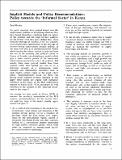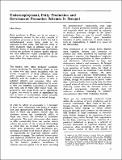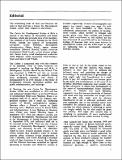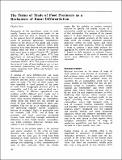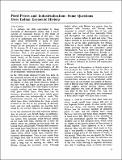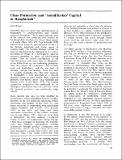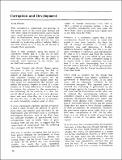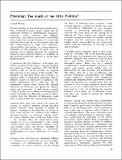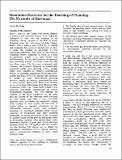Volume 9, Issue 3: Development Studies at Swansea and Bath
Browse by
Recent Submissions
-
Implicit Models and Policy Recommendations: Policy towards the ‘Informal Sector’ in Kenya
(Institute of Development Studies, 01/02/1978)SUMMARY Encouragement of the ‘informal sector’ of employment in developing countries, recommended by many advisers including the ILO's mission to Kenya (1972), is attacked as an ambiguous and, in part, counter?productive ... -
Underemployment, Petty Production and Government Promotion Schemes in Senegal
(Institute of Development Studies, 01/02/1978)SUMMARY Urban petty producers in underdeveloped countries provide many of the necessary wage?goods demanded by the urban and rural population at relatively cheap prices. Large numbers of youth are trained in small workshops ... -
Editorial
(Institute of Development Studies, 01/02/1978) -
Where have all the Linkages Gone? Staples in the Ghanaian Economy
(Institute of Development Studies, 01/02/1978)SUMMARY There has been renewed interest in the relevance of the growth of a staple export trade to development. The staple is supposed to stimulate growth through technical, market and fiscal linkages. Some of this ... -
The Terms of Trade of Food Producers as a Mechanism of Rural Differentiation
(Institute of Development Studies, 01/02/1978)SUMMARY The seasonal and spatial structure of the barter of trade of food producers can create systematic economic disparaties both within and between rural communities. The argument is based on prices in Ghana but the ... -
Food Prices and Industrialisation: Some Questions from Indian Economic History
(Institute of Development Studies, 01/02/1978)SUMMARY A recent study of the demand for British manufactures in Asia at the end of the last century suggests that demand increased when food prices rose, not when they fell. Because many people were below the threshold ... -
Politics and Administration in the Israeli Port of Ashdod
(Institute of Development Studies, 01/02/1978)SUMMARY Ashdod is a new port, administered by a new bureaucracy, in a new town, settled by new immigrants. This article examines power relations between the Israel Ports Authority (IPA), port workers, the Histadruth ... -
Class Formation and ‘Antediluvian’ Capital in Bangladesh
(Institute of Development Studies, 01/02/1978)SUMMARY Bangladesh has been erroneously attributed a homogeneous agrarian structure by unwarranted extrapolation from surveys made in Comilla district. Data from the 1940s suggests greater differentiation in the North and ... -
Corruption and Development
(Institute of Development Studies, 01/02/1978)SUMMARY Corruption does not necessarily either hinder or encourage development and even when it helps, it is not thereby legitimised. Development, however, in the form now favoured of State control of the economy, does ... -
The Planning Process: Lessons of the Past and a Model for the Future
(Institute of Development Studies, 01/02/1978)SUMMARY Development planning, as practised over the last 25 years, has been technocratic, politically isolated and naive. Planners have entered a blind alley, described as ‘narrow?planning’, where professionalisation and ... -
Planning: Too much or too little Politics?
(Institute of Development Studies, 01/02/1978)SUMMARY Planning failures in less developed countries have sometimes been attributed to too much political interference of an arbitrary and haphazard nature. Another explanation may be too little rather than too much ... -
Simulation Exercises for the Teaching of Planning: The Example of Ruritania
(Institute of Development Studies, 01/02/1978)SUMMARY This article outlines experience with the use of a simulation exercise in teaching development planning. Two years of using the exercise has shown that simulation is an invaluable aid, especially in the teaching ...

